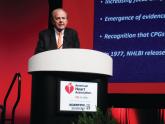Dr. Egan described his own experience consulting with variously sized local practices. “I’ve worked with practices in South Carolina for 18 years, and I’ve seen the majority now become part of health care systems. When a small practice is in a rural area, it shares electronic health records with a larger group, and they get access to a network of specialists and a broader range of resources. That’s the advantage to larger networks. They get access to treatment for medical and behavioral problems in pretty close to real time. The technology is spreading rapidly and is being used. I’ve seen groups with 20 practices that have the resources to hire three PharmDs, who then rotate to meet with patients [from all the practices] to do drug reconciliation and education. An individual practice couldn’t afford something like this. This is happening to treat things like depression and opioid addiction.”
“Hypertension management is no longer a patient going to see a doctor for 15 minutes, getting their blood pressure checked, and then leaving with a prescription,” said Dr. Casey. “We are not doing a good enough job measuring, diagnosing, and treating high blood pressure. We have to come up with better ways to do it. We think that the guideline provides the pathway forward for this.”
Just after the ACC/AHA guidelines had their introduction in November, Target:BP in collaboration with TEDMED organized a panel discussion of the new guideline that included Thomas H. Lee, MD, chief medical officer of Press Ganey in Boston and a practicing internal medicine physician at Brigham and Women’s Hospital in Boston.
During the webcast discussion, Dr. Lee delivered this message to U.S. PCPs and other physicians and health care providers about the future of U.S. hypertension management:
